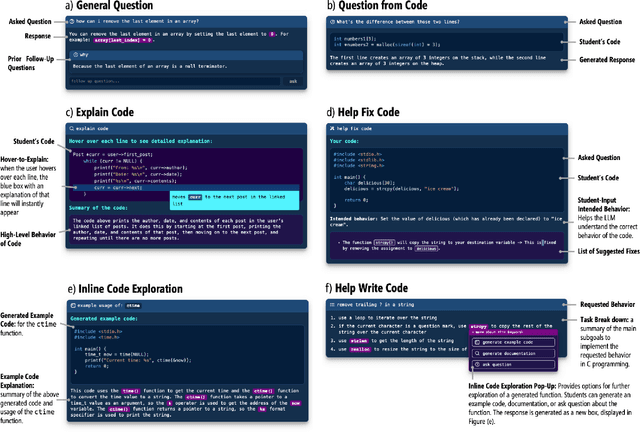Michelle Craig
CodeAid: Evaluating a Classroom Deployment of an LLM-based Programming Assistant that Balances Student and Educator Needs
Jan 20, 2024



Abstract:Timely, personalized feedback is essential for students learning programming, especially as class sizes expand. LLM-based tools like ChatGPT offer instant support, but reveal direct answers with code, which may hinder deep conceptual engagement. We developed CodeAid, an LLM-based programming assistant delivering helpful, technically correct responses, without revealing code solutions. For example, CodeAid can answer conceptual questions, generate pseudo-code with line-by-line explanations, and annotate student's incorrect code with fix suggestions. We deployed CodeAid in a programming class of 700 students for a 12-week semester. A thematic analysis of 8,000 usages of CodeAid was performed, further enriched by weekly surveys, and 22 student interviews. We then interviewed eight programming educators to gain further insights on CodeAid. Findings revealed students primarily used CodeAid for conceptual understanding and debugging, although a minority tried to obtain direct code. Educators appreciated CodeAid's educational approach, and expressed concerns about occasional incorrect feedback and students defaulting to ChatGPT.
The Robots are Here: Navigating the Generative AI Revolution in Computing Education
Oct 01, 2023Abstract:Recent advancements in artificial intelligence (AI) are fundamentally reshaping computing, with large language models (LLMs) now effectively being able to generate and interpret source code and natural language instructions. These emergent capabilities have sparked urgent questions in the computing education community around how educators should adapt their pedagogy to address the challenges and to leverage the opportunities presented by this new technology. In this working group report, we undertake a comprehensive exploration of LLMs in the context of computing education and make five significant contributions. First, we provide a detailed review of the literature on LLMs in computing education and synthesise findings from 71 primary articles. Second, we report the findings of a survey of computing students and instructors from across 20 countries, capturing prevailing attitudes towards LLMs and their use in computing education contexts. Third, to understand how pedagogy is already changing, we offer insights collected from in-depth interviews with 22 computing educators from five continents who have already adapted their curricula and assessments. Fourth, we use the ACM Code of Ethics to frame a discussion of ethical issues raised by the use of large language models in computing education, and we provide concrete advice for policy makers, educators, and students. Finally, we benchmark the performance of LLMs on various computing education datasets, and highlight the extent to which the capabilities of current models are rapidly improving. Our aim is that this report will serve as a focal point for both researchers and practitioners who are exploring, adapting, using, and evaluating LLMs and LLM-based tools in computing classrooms.
 Add to Chrome
Add to Chrome Add to Firefox
Add to Firefox Add to Edge
Add to Edge